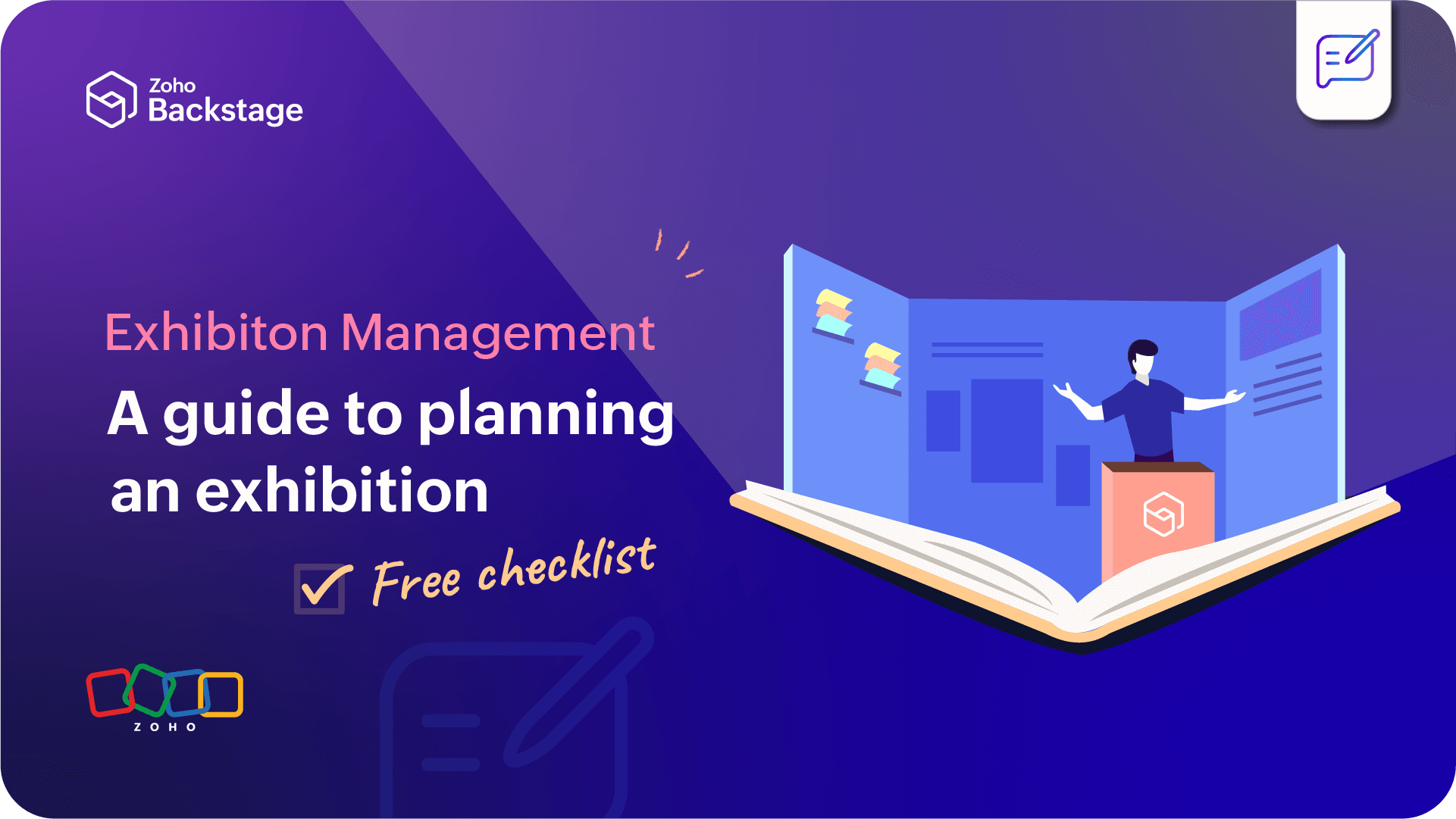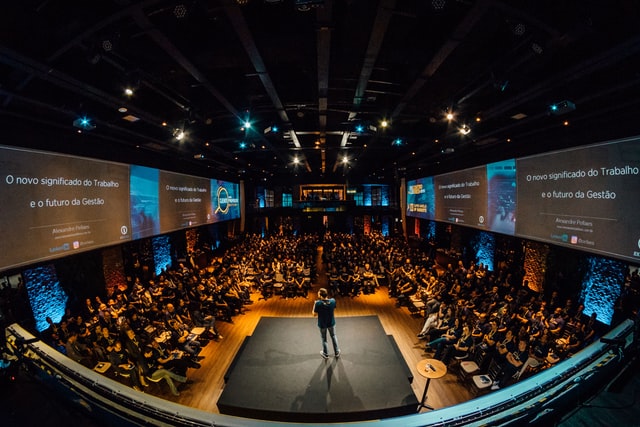- HOME
- Management
- Exhibition Management: A guide to planning an exhibition + free checklist
Exhibition Management: A guide to planning an exhibition + free checklist
- Last Updated : September 12, 2024
- 3.2K Views
- 5 Min Read

Exhibitions can be a whirlwind of excitement, a melting pot of possibilities, and a breeding ground for business success. Navigating this dynamic landscape can feel daunting, especially for first-timers. But what if we told you there's a way to transform that nervous excitement into a well-oiled machine, ensuring your exhibition participation is a resounding success?
This guide is your roadmap, with everything you need to turn your exhibition anxiety into epic win-win-wins! We're spilling the beans on how to navigate the exhibition labyrinth, leaving you with not just a dazzling event, but also bowled-over attendees and business goals so smashed they'll need a dustpan.
What is exhibition management?
Exhibition management is the art and science of orchestrating every aspect of a trade show or exhibition, from initial conception to post-event follow-up. It encompasses everything from booth design and logistics to attendee engagement and lead generation. And with 92% of attendees citing a desire to discover new products and services (The Tradeshow Network Marketing Group), the pressure to deliver an impactful experience is higher than ever.
Why is exhibition management important?
The numbers speak for themselves. The B2B trade show market in the US is a behemoth, valued at $10.17 billion in 2022 and projected to reach a staggering $14.72 billion by 2027 (Statista). Why this meteoric rise? Because exhibitions offer unparalleled opportunities for:
Lead generation: 92% of attendees attend trade shows to discover and learn about new products and services (The Tradeshow Network Marketing Group). That's a goldmine of potential leads for exhibitors!
Brand awareness: Exhibitions put your brand front and center, fostering deeper connections with your target audience.
Networking: Build valuable relationships with industry peers, potential partners, and key decision-makers.
Product launches: Create a splash for your latest offerings in a captive audience eager to learn and innovate.
Navigating the exhibition landscape: Types of exhibitions
Now, let's delve into the diverse world of exhibitions. You'll encounter an array of formats, each catering to specific needs.
Industry-Specific Trade Shows
Examples: CES (technology), E3 (gaming), SHOT Show (firearms), Auto Expo (automobiles).
Focus: Networking with industry professionals, showcasing innovations, securing partnerships, and generating leads within a specific niche.
Key Tips: Target booth design and messaging to the specific interests of attendees, offer product demonstrations and expert talks, foster networking opportunities between exhibitors and attendees.
Consumer Shows
Examples: Comic Con, New York Toy Fair, Home & Garden Show, Food & Wine Festivals.
Focus: Brand awareness, product education, generating sales, and building direct relationships with potential customers.
Key Tips: Create interactive displays, offer samples and giveaways, host engaging presentations and contests, leverage influencer marketing to reach target audiences.
Conferences and Seminars
Examples: TED Talks, Web Summit, World Economic Forum, Industry-specific conferences.
Focus: Knowledge sharing, professional development, thought leadership, and networking among industry experts and peers.
Key Tips: Invite renowned speakers and industry leaders, curate engaging panel discussions and workshops, provide ample networking opportunities through breakout sessions and receptions.
An exhibition planning checklist for event organizers
So, you're ready to embark on your exhibition management journey? Let's look at a checklist to make things easier.
PRE-EVENT PLANNING
Concept and Budget
Define event goals and objectives (brand awareness, lead generation, sales, etc.).
Set a realistic budget for venue rental, equipment, marketing, staffing, and contingencies.
Secure sponsorships and partnership opportunities.
Venue and Logistics
Choose a suitable venue with adequate space, amenities, and infrastructure (electricity, internet, accessibility).
Develop a floor plan, allocating booth sizes and ensuring efficient traffic flow.
Arrange for furniture, equipment rentals, and exhibitor services (Internet, catering, power).
Design event signage and branding elements for a cohesive experience.
Marketing and Promotion
Develop a marketing strategy to attract exhibitors and attendees (targeted emails, social media, advertising).
Create a compelling event website with registration forms, exhibitor directory, and event schedule.
Partner with media outlets and industry influencers for promotional reach.
Attendee Engagement
Plan engaging activities and sessions (seminars, workshops, networking events, competitions).
Develop a mobile app for event information, scheduling, and attendee interaction.
Design interactive exhibits and booth spaces to encourage attendee engagement.
Pre-Registration and Operations
Implement an online pre-registration system for exhibitors and attendees.
Develop clear communication channels for exhibitors and event staff.
Finalize logistics and staffing requirements for event setup and execution.
EVENT DAY
Operations and Guest Services
Manage booth allocation and ensure smooth setup and breakdown.
Provide efficient registration and information services for attendees.
Offer excellent customer service; make sure your attendees and exhibitors have a positive experience at your exhibition. This includes providing them with helpful information, answering their questions, and resolving any problems they may have.
Attendee Engagement and Activities
Facilitate networking opportunities and encourage interaction between attendees and exhibitors.
Host planned sessions, workshops, and demonstrations according to schedule.
Monitor attendee engagement and adapt activities or sessions as needed.
POST-EVENT
Metrics and Feedback
Collect attendee and exhibitor feedback through surveys, questionnaires, and interviews.
Analyze data and metrics to measure event success against defined goals.
Identify areas for improvement and plan for future events.
Follow-up and Reporting
Send thank-you emails to attendees and exhibitors.
Share event highlights and key takeaways through reports and social media.
Generate leads and nurture post-event business opportunities.
Additional Tips
Invest in event technology to help you streamline your expo management and operations. For example, you can use an event management platform that provides online registration, ticketing systems, and lead capture tools. More on that in the next section!
Be prepared for unforeseen challenges and have contingency plans in place.
Stay flexible and adaptable to adjust to changing needs and feedback throughout the planning process.
Using event technology to improve the whole experience at trade shows
Event technology can be a game-changer for exhibition management. Here are a few ways that it can improve the experience for organizers, exhibitors, and attendees:
For organizers: As mentioned, event technology can help you streamline the planning and execution of your exhibition. For example, you can use online registration and ticketing systems to manage attendance and event management software to track your budget, schedule, and tasks.
For exhibitors: Event technology can help exhibitors attract leads and generate sales. For example, they can use lead capture tools to collect information from attendees and event apps to connect with potential customers.
For attendees: Event technology can help attendees make the most of their time at the exhibition. For example, they can use event apps to find exhibitors, view schedules, plan their itinerary, and network with exhibitors and other attendees.
Congratulations! You've reached the end of this guide—now the world of exhibitions awaits! Armed with this knowledge, you're ready to create an unforgettable experience for attendees, forge valuable connections, and watch your business flourish.
Exhibitions offer a unique opportunity to break free from the digital screen and connect with people on a human level. They're a microcosm of innovation, collaboration, and the sheer potential of face-to-face interaction. As you enter the exhibition arena, remember: the possibilities are limitless. So, unleash your creativity, embrace the energy, and be ready to write your own exhibition success story.
 Lavanya
LavanyaMarketer by day, geek extraordinaire by night—You can often find me at gig nights or the philosophy sections of bookstores. In my free time, I usually got headphones on, lost in an audiobook or podcast while indulging in my latest hobby, aka hyperfixation du jour. I like to travel to make feline friends everywhere I go. Sometimes I write. Join me as I navigate through the event industry!






